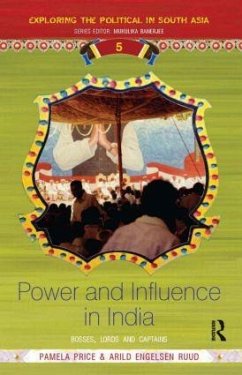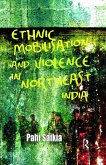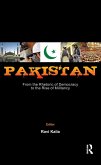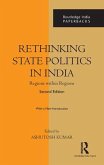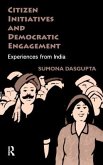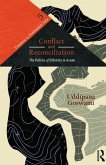Power and Influence in India
Bosses, Lords and Captains
Herausgeber: Price, Pamela; Ruud, Arild Engelsen
Power and Influence in India
Bosses, Lords and Captains
Herausgeber: Price, Pamela; Ruud, Arild Engelsen
- Gebundenes Buch
- Merkliste
- Auf die Merkliste
- Bewerten Bewerten
- Teilen
- Produkt teilen
- Produkterinnerung
- Produkterinnerung
Foregrounding the importance of individual leaders in the projection of politics in South Asia, this multidisciplinary collection of articles illustrates common styles of leadership in modern India, in domains ranging from rural settings and urban neighbourhoods to political parties and state governments.
Andere Kunden interessierten sich auch für
![Ethnic Mobilisation and Violence in Northeast India Ethnic Mobilisation and Violence in Northeast India]() Pahi SaikiaEthnic Mobilisation and Violence in Northeast India180,99 €
Pahi SaikiaEthnic Mobilisation and Violence in Northeast India180,99 €![Pakistan: From the Rhetoric of Democracy to the Rise of Militancy Pakistan: From the Rhetoric of Democracy to the Rise of Militancy]() Pakistan: From the Rhetoric of Democracy to the Rise of Militancy180,99 €
Pakistan: From the Rhetoric of Democracy to the Rise of Militancy180,99 €![Wronging Rights? Wronging Rights?]() Wronging Rights?187,99 €
Wronging Rights?187,99 €![Rethinking State Politics in India Rethinking State Politics in India]() Rethinking State Politics in India115,99 €
Rethinking State Politics in India115,99 €![Citizen Initiatives and Democratic Engagement Citizen Initiatives and Democratic Engagement]() Sumona DasguptaCitizen Initiatives and Democratic Engagement179,99 €
Sumona DasguptaCitizen Initiatives and Democratic Engagement179,99 €![From Oppression to Assertion From Oppression to Assertion]() Nirmala BuchFrom Oppression to Assertion180,99 €
Nirmala BuchFrom Oppression to Assertion180,99 €![Conflict and Reconciliation Conflict and Reconciliation]() Uddipana GoswamiConflict and Reconciliation181,99 €
Uddipana GoswamiConflict and Reconciliation181,99 €-
-
-
Foregrounding the importance of individual leaders in the projection of politics in South Asia, this multidisciplinary collection of articles illustrates common styles of leadership in modern India, in domains ranging from rural settings and urban neighbourhoods to political parties and state governments.
Hinweis: Dieser Artikel kann nur an eine deutsche Lieferadresse ausgeliefert werden.
Hinweis: Dieser Artikel kann nur an eine deutsche Lieferadresse ausgeliefert werden.
Produktdetails
- Produktdetails
- Verlag: Taylor & Francis
- Seitenzahl: 288
- Erscheinungstermin: 28. Juli 2010
- Englisch
- Abmessung: 216mm x 140mm x 18mm
- Gewicht: 481g
- ISBN-13: 9780415585958
- ISBN-10: 0415585953
- Artikelnr.: 31386227
- Herstellerkennzeichnung
- Libri GmbH
- Europaallee 1
- 36244 Bad Hersfeld
- gpsr@libri.de
- Verlag: Taylor & Francis
- Seitenzahl: 288
- Erscheinungstermin: 28. Juli 2010
- Englisch
- Abmessung: 216mm x 140mm x 18mm
- Gewicht: 481g
- ISBN-13: 9780415585958
- ISBN-10: 0415585953
- Artikelnr.: 31386227
- Herstellerkennzeichnung
- Libri GmbH
- Europaallee 1
- 36244 Bad Hersfeld
- gpsr@libri.de
Pamela Price is Professor of South Asian History, University of Oslo. Arild Engelsen Ruud is Professor of South Asian Studies, University of Oslo.
Introduction*The Introduction has been written by Price with assistance
from Ruud. Earlier versions of it were presented by Ruud at the workshop,
'Politics of Environmental Challenges in South Asia in the 21st Century'
(Oslo, 2008) and the panel, 'Political Creativity in South Asia', at the
conference, NORASIA IV (Trondheim, 2008). Price presented a version to
members of the Oslo South Asia Symposium. Thanks to participants in these
events and the anonymous reviewer for comments. Gratitude goes to David
Gilmartin and Ronald Herring on reading and critiquing this, and to Harald
Baldersheim for suggestions on reading. The usual disclaimers apply.;
Chapter 1 Creating Followers, Gaining Patrons: Leadership Strategies in a
Tamil Nadu Village, Björn Alm; Chapter 2 Leadership and Political Work,
Mukulika Banerjee; Chapter 3 Wrestling with (Body) Politics:
Understanding'Goonda' Political Styles in North India, Lucia Michelutti;
Chapter 4 To Create a Crowd: Student Leaders in Dhaka, Arild Engelsen Ruud;
Chapter 5 Contradictory Youth Politics: Student Mobilisation in Uttar
Pradesh, Craig Jeffrey; Chapter 6 The New Caste Headmen? Dalit Movement
Leadership in Tamil Nadu*This was first presented to the 'Creating a
Constituency/Producing a Leader in South Asia' workshop in Oslo, 1-3
December 2006. I must thank the participants for insightful comments,
suggestions and inspiration. I am indebted to Lucia Michelutti and Andrew
Wyatt for detailed comments and especially to the editors for their
constructive critiques and suggestions. Needless to say, much of the credit
must be shared with the aforementioned but any faults are entirely my own.,
Hugo Gorringe; Chapter 7 The Enduring Appeal of Populist Leadership in
Contemporary Tamil Nadu*I am very grateful to the editors and the other
participants at the original workshop for helpful comments on the first
draft of this article. I am also endebted to M. Vijayabaskar for his
insightful commentary on Vijayakanth's leadership trajectory. The usual
disclaimers apply., Andrew Wyatt; Chapter 8 Leadership and the Power of
Honourin a Corrupt System*(c) Individual copyright for this article with
Paul R. Brass., R. Brass Paul; Chapter 9 Beyond Clientelism: Digvijay
Singh'sparticipatory, Pro-Poor Strategyin Madhya Pradesh, James Manor;
Chapter 10 Development, Drought and Campaign Rhetoric in South India:
Chandrababu Naidu and the Telugu Desam Party, 2003-2004*For reading and
commenting on various drafts of this paper I am grateful to David
Gilmartin, Ronald Herring, Arild Ruud, K. C. Suri, and participants at the
original conference. Errors of interpretation remain mine., Pamela Price;
from Ruud. Earlier versions of it were presented by Ruud at the workshop,
'Politics of Environmental Challenges in South Asia in the 21st Century'
(Oslo, 2008) and the panel, 'Political Creativity in South Asia', at the
conference, NORASIA IV (Trondheim, 2008). Price presented a version to
members of the Oslo South Asia Symposium. Thanks to participants in these
events and the anonymous reviewer for comments. Gratitude goes to David
Gilmartin and Ronald Herring on reading and critiquing this, and to Harald
Baldersheim for suggestions on reading. The usual disclaimers apply.;
Chapter 1 Creating Followers, Gaining Patrons: Leadership Strategies in a
Tamil Nadu Village, Björn Alm; Chapter 2 Leadership and Political Work,
Mukulika Banerjee; Chapter 3 Wrestling with (Body) Politics:
Understanding'Goonda' Political Styles in North India, Lucia Michelutti;
Chapter 4 To Create a Crowd: Student Leaders in Dhaka, Arild Engelsen Ruud;
Chapter 5 Contradictory Youth Politics: Student Mobilisation in Uttar
Pradesh, Craig Jeffrey; Chapter 6 The New Caste Headmen? Dalit Movement
Leadership in Tamil Nadu*This was first presented to the 'Creating a
Constituency/Producing a Leader in South Asia' workshop in Oslo, 1-3
December 2006. I must thank the participants for insightful comments,
suggestions and inspiration. I am indebted to Lucia Michelutti and Andrew
Wyatt for detailed comments and especially to the editors for their
constructive critiques and suggestions. Needless to say, much of the credit
must be shared with the aforementioned but any faults are entirely my own.,
Hugo Gorringe; Chapter 7 The Enduring Appeal of Populist Leadership in
Contemporary Tamil Nadu*I am very grateful to the editors and the other
participants at the original workshop for helpful comments on the first
draft of this article. I am also endebted to M. Vijayabaskar for his
insightful commentary on Vijayakanth's leadership trajectory. The usual
disclaimers apply., Andrew Wyatt; Chapter 8 Leadership and the Power of
Honourin a Corrupt System*(c) Individual copyright for this article with
Paul R. Brass., R. Brass Paul; Chapter 9 Beyond Clientelism: Digvijay
Singh'sparticipatory, Pro-Poor Strategyin Madhya Pradesh, James Manor;
Chapter 10 Development, Drought and Campaign Rhetoric in South India:
Chandrababu Naidu and the Telugu Desam Party, 2003-2004*For reading and
commenting on various drafts of this paper I am grateful to David
Gilmartin, Ronald Herring, Arild Ruud, K. C. Suri, and participants at the
original conference. Errors of interpretation remain mine., Pamela Price;
Introduction*The Introduction has been written by Price with assistance
from Ruud. Earlier versions of it were presented by Ruud at the workshop,
'Politics of Environmental Challenges in South Asia in the 21st Century'
(Oslo, 2008) and the panel, 'Political Creativity in South Asia', at the
conference, NORASIA IV (Trondheim, 2008). Price presented a version to
members of the Oslo South Asia Symposium. Thanks to participants in these
events and the anonymous reviewer for comments. Gratitude goes to David
Gilmartin and Ronald Herring on reading and critiquing this, and to Harald
Baldersheim for suggestions on reading. The usual disclaimers apply.;
Chapter 1 Creating Followers, Gaining Patrons: Leadership Strategies in a
Tamil Nadu Village, Björn Alm; Chapter 2 Leadership and Political Work,
Mukulika Banerjee; Chapter 3 Wrestling with (Body) Politics:
Understanding'Goonda' Political Styles in North India, Lucia Michelutti;
Chapter 4 To Create a Crowd: Student Leaders in Dhaka, Arild Engelsen Ruud;
Chapter 5 Contradictory Youth Politics: Student Mobilisation in Uttar
Pradesh, Craig Jeffrey; Chapter 6 The New Caste Headmen? Dalit Movement
Leadership in Tamil Nadu*This was first presented to the 'Creating a
Constituency/Producing a Leader in South Asia' workshop in Oslo, 1-3
December 2006. I must thank the participants for insightful comments,
suggestions and inspiration. I am indebted to Lucia Michelutti and Andrew
Wyatt for detailed comments and especially to the editors for their
constructive critiques and suggestions. Needless to say, much of the credit
must be shared with the aforementioned but any faults are entirely my own.,
Hugo Gorringe; Chapter 7 The Enduring Appeal of Populist Leadership in
Contemporary Tamil Nadu*I am very grateful to the editors and the other
participants at the original workshop for helpful comments on the first
draft of this article. I am also endebted to M. Vijayabaskar for his
insightful commentary on Vijayakanth's leadership trajectory. The usual
disclaimers apply., Andrew Wyatt; Chapter 8 Leadership and the Power of
Honourin a Corrupt System*(c) Individual copyright for this article with
Paul R. Brass., R. Brass Paul; Chapter 9 Beyond Clientelism: Digvijay
Singh'sparticipatory, Pro-Poor Strategyin Madhya Pradesh, James Manor;
Chapter 10 Development, Drought and Campaign Rhetoric in South India:
Chandrababu Naidu and the Telugu Desam Party, 2003-2004*For reading and
commenting on various drafts of this paper I am grateful to David
Gilmartin, Ronald Herring, Arild Ruud, K. C. Suri, and participants at the
original conference. Errors of interpretation remain mine., Pamela Price;
from Ruud. Earlier versions of it were presented by Ruud at the workshop,
'Politics of Environmental Challenges in South Asia in the 21st Century'
(Oslo, 2008) and the panel, 'Political Creativity in South Asia', at the
conference, NORASIA IV (Trondheim, 2008). Price presented a version to
members of the Oslo South Asia Symposium. Thanks to participants in these
events and the anonymous reviewer for comments. Gratitude goes to David
Gilmartin and Ronald Herring on reading and critiquing this, and to Harald
Baldersheim for suggestions on reading. The usual disclaimers apply.;
Chapter 1 Creating Followers, Gaining Patrons: Leadership Strategies in a
Tamil Nadu Village, Björn Alm; Chapter 2 Leadership and Political Work,
Mukulika Banerjee; Chapter 3 Wrestling with (Body) Politics:
Understanding'Goonda' Political Styles in North India, Lucia Michelutti;
Chapter 4 To Create a Crowd: Student Leaders in Dhaka, Arild Engelsen Ruud;
Chapter 5 Contradictory Youth Politics: Student Mobilisation in Uttar
Pradesh, Craig Jeffrey; Chapter 6 The New Caste Headmen? Dalit Movement
Leadership in Tamil Nadu*This was first presented to the 'Creating a
Constituency/Producing a Leader in South Asia' workshop in Oslo, 1-3
December 2006. I must thank the participants for insightful comments,
suggestions and inspiration. I am indebted to Lucia Michelutti and Andrew
Wyatt for detailed comments and especially to the editors for their
constructive critiques and suggestions. Needless to say, much of the credit
must be shared with the aforementioned but any faults are entirely my own.,
Hugo Gorringe; Chapter 7 The Enduring Appeal of Populist Leadership in
Contemporary Tamil Nadu*I am very grateful to the editors and the other
participants at the original workshop for helpful comments on the first
draft of this article. I am also endebted to M. Vijayabaskar for his
insightful commentary on Vijayakanth's leadership trajectory. The usual
disclaimers apply., Andrew Wyatt; Chapter 8 Leadership and the Power of
Honourin a Corrupt System*(c) Individual copyright for this article with
Paul R. Brass., R. Brass Paul; Chapter 9 Beyond Clientelism: Digvijay
Singh'sparticipatory, Pro-Poor Strategyin Madhya Pradesh, James Manor;
Chapter 10 Development, Drought and Campaign Rhetoric in South India:
Chandrababu Naidu and the Telugu Desam Party, 2003-2004*For reading and
commenting on various drafts of this paper I am grateful to David
Gilmartin, Ronald Herring, Arild Ruud, K. C. Suri, and participants at the
original conference. Errors of interpretation remain mine., Pamela Price;

